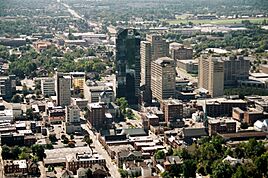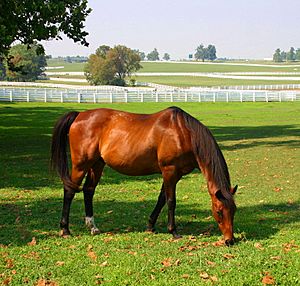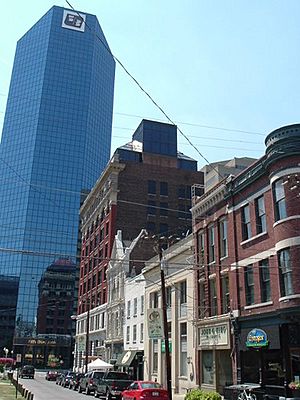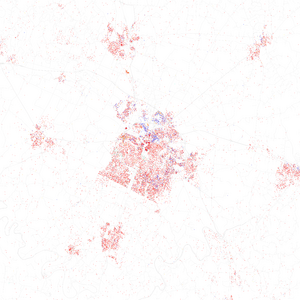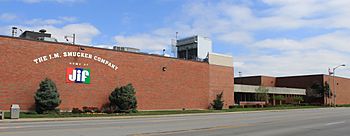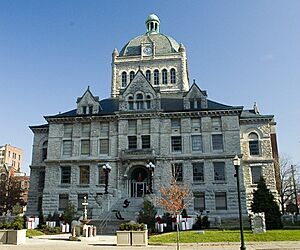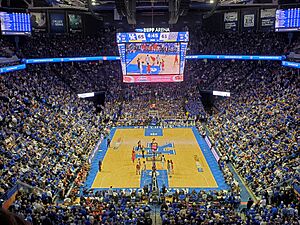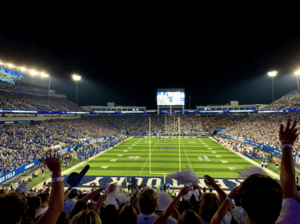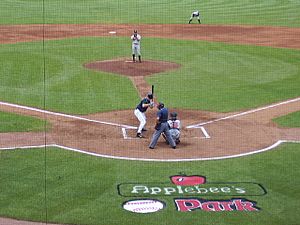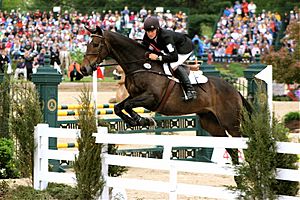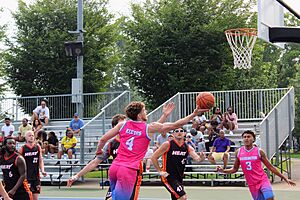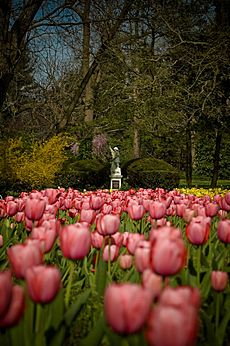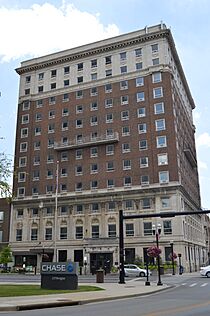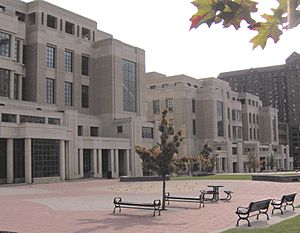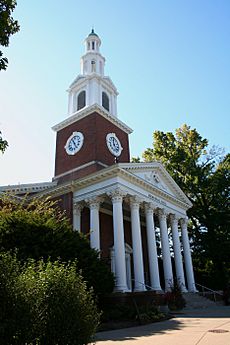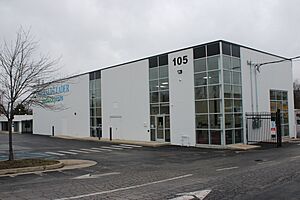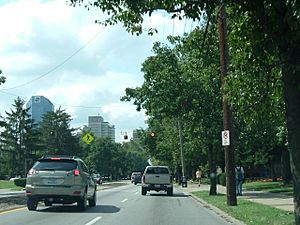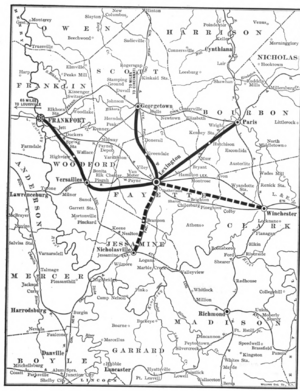Lexington, Kentucky facts for kids
Quick facts for kids
Lexington
|
||
|---|---|---|
|
Consolidated city-county
|
||
|
Lexington skyline
Rupp Arena
Wimbeldon Farm
Kroger Field
Old Fayette County Courthouse
|
||
|
||
| Nickname(s):
Athens of the West, Horse Capital of the World
|
||
| Country | United States | |
| State | Kentucky | |
| Counties | Fayette | |
| Established | 1782 | |
| Incorporated | 1831 | |
| Named for | Lexington, Massachusetts | |
| Government | ||
| • Type | Mayor–council | |
| Area | ||
| • Consolidated city-county | 285.54 sq mi (739.54 km2) | |
| • Land | 283.64 sq mi (734.62 km2) | |
| • Water | 1.90 sq mi (4.92 km2) | |
| • Urban | 87.5 sq mi (226.7 km2) | |
| Elevation | 978 ft (298 m) | |
| Population
(2020)
|
||
| • Consolidated city-county | 322,570 | |
| • Estimate
(2024)
|
329,437 |
|
| • Rank | US: 59th Kentucky: 2nd |
|
| • Density | 1,129.68/sq mi (436.177/km2) | |
| • Urban | 315,631 (US: 130th) | |
| • Metro | 517,056 (US: 109th) | |
| • CSA | 745,033 (US: 70th) | |
| Demonym(s) | Lexingtonian | |
| Time zone | UTC−5 (EST) | |
| • Summer (DST) | UTC−4 (EDT) | |
| ZIP codes |
40502–40517, 40522–40524, 40526, 40533, 40536, 40544, 40546, 40550, 40555, 40574–40583, 40588, 40591, 40598
|
|
| Area code | 859 | |
| FIPS code | 21-46027 | |
Lexington is a large city in Kentucky, United States. It is also the main city of Fayette County. In 2020, about 322,570 people lived there. This makes it the second-largest city in Kentucky, after Louisville. It is also one of the biggest cities in the Southeast.
Lexington is famous as the "Horse Capital of the World." This is because there are many horse farms nearby. You can also find the Kentucky Horse Park, The Red Mile and Keeneland race courses here. The city is part of Kentucky's beautiful Bluegrass region. Important places in Lexington include Rupp Arena, the University of Kentucky, and Transylvania University.
Lexington is the center of a larger area with over 516,000 people. Since 1974, the city and Fayette County have worked together as one government. It has a mayor and a council that help run the city.
Contents
History of Lexington
Lexington got its name in June 1775. This was 17 years before Kentucky became a state. A group of explorers, led by William McConnell, were camping by Elkhorn Creek. They heard that the colonists had won the Battles of Lexington and Concord. So, they named their camp "Lexington" after the town in Massachusetts. It was the first place in America to be named after that battle.
In 1780, 45 early settlers signed an agreement called the Lexington Compact. At that time, Lexington was also known as Fort Lexington. It had walls to protect people from attacks. The agreement gave each family a small plot of land inside the fort for their home. It also gave them larger plots outside the fort for farming.
In 1781, a large group of about 600 pioneers arrived. They were called "The Travelling Church." They started many churches, including the South Elkhorn Christian Church. In 1782, Lexington officially became a town. Around 1790, the First African Baptist Church was started by Peter Durrett. He was a Baptist preacher who had helped guide "The Travelling Church." This church is the oldest Black Baptist church in Kentucky.
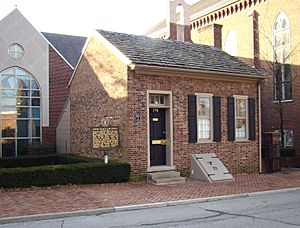
In the early 1800s, Lexington was growing fast. People thought it would become one of the biggest cities west of the Appalachian Mountains. One visitor described it as a busy, wealthy town with many elegant homes.
John Wesley Hunt, a farmer in Lexington, became the first millionaire west of the Alleghenies. Henry Clay, a famous lawyer, also lived in Lexington. He helped lead the "War Hawks" who wanted war with Britain in 1812. Clay later helped negotiate the Treaty of Ghent in 1814, which ended the war.
In 1833, a serious illness spread through Lexington. About 500 out of 7,000 people in the city died. Many people, including London Ferrill, a preacher from First African Baptist, stayed to help those who were sick.
Many farms around Lexington used enslaved people for work. In the city, enslaved people worked in homes, as skilled workers, and in different trades. By 1850, Lexington had a very high number of enslaved people. The city also had many free Black people. The First African Baptist Church, led by London Ferrill, had over 1,800 members by 1850. It was the largest church in Kentucky at that time.
Lexington in the 20th Century
In the early 1900s, school superintendent Massillon Alexander Cassidy worked to improve schools. He focused on better buildings and teacher training. He wanted more people to learn to read and have access to public schools.
In 1917, there were some disagreements between Black and white communities. A large African American fair was happening, bringing many people to the city. A fight started between some soldiers and civilians, which grew into a larger disturbance. The Kentucky National Guard was called in to help bring peace.
In 1920, tensions rose again during a trial. The governor called in the National Guard and later the United States Army to keep order. Soldiers were in the city for two weeks to ensure peace.
During the Great Depression in 1935, the Addiction Research Center (ARC) was created in Lexington. It was one of the first places in the country to help people with addiction. It was later changed into a federal prison hospital, now called the Federal Medical Center, Lexington. Lexington also had a unique "pack horse library" project in the late 1930s. This project delivered books to people in rural areas using horses.
Geography and Planning
The Lexington-Fayette area includes five other counties: Clark, Jessamine, Bourbon, Woodford, and Scott. It is the second-largest metro area in Kentucky. The city covers about 285.5 square miles (739.5 square kilometers). Most of this area is land, with a small part covered by water.
Cityscape
Lexington Downtown Area Panorama.jpg|800px|A wide view of downtown Lexington. Lexington has a mix of different types of buildings and areas.
City Planning
Lexington has grown quickly, but it also wants to keep its beautiful horse farms. In 1958, Lexington created the first urban growth boundary in the country. This rule limits where new buildings can be built. It helps protect the open spaces and horse farms around the city.
In 1996, the city expanded this boundary a bit. This caused some debate among residents about how Lexington should grow. Later, in 2000, a plan was adopted to buy the development rights from farms. This helps keep them as open land.
Climate
Lexington has four clear seasons. Summers are hot and humid, while winters are moderately cold. You can expect cool breezes and comfortable nights in the summer. The city does not usually have very long periods of extreme heat, cold, rain, wind, or snow.
The average temperature in January is about 33.9°F (1.1°C). In July, it averages 76.7°F (24.8°C). Each year, there are about 25 days where the temperature reaches 90°F (32°C) or higher. About 23 days in winter have high temperatures at or below freezing. Lexington gets about 49.84 inches (126.6 cm) of rain each year. Snowfall averages about 14.5 inches (36.8 cm) per season.
People of Lexington
| Historical population | |||
|---|---|---|---|
| Census | Pop. | %± | |
| 1790 | 834 | — | |
| 1800 | 1,795 | 115.2% | |
| 1810 | 4,326 | 141.0% | |
| 1820 | 5,270 | 21.8% | |
| 1830 | 6,026 | 14.3% | |
| 1840 | 6,997 | 16.1% | |
| 1850 | 8,159 | 16.6% | |
| 1860 | 9,321 | 14.2% | |
| 1870 | 14,801 | 58.8% | |
| 1880 | 16,656 | 12.5% | |
| 1890 | 21,567 | 29.5% | |
| 1900 | 26,369 | 22.3% | |
| 1910 | 35,099 | 33.1% | |
| 1920 | 41,534 | 18.3% | |
| 1930 | 45,736 | 10.1% | |
| 1940 | 49,304 | 7.8% | |
| 1950 | 55,534 | 12.6% | |
| 1960 | 62,810 | 13.1% | |
| 1970 | 108,137 | 72.2% | |
| 1980 | 204,165 | 88.8% | |
| 1990 | 225,366 | 10.4% | |
| 2000 | 260,512 | 15.6% | |
| 2010 | 295,803 | 13.5% | |
| 2020 | 322,570 | 9.0% | |
| 2024 (est.) | 329,437 | 11.4% | |
| U.S. Decennial Census | |||
The Lexington-Fayette area includes several counties and had a population of 516,811 in 2020. The larger combined area had 747,919 people in 2020.
In 2020, Lexington had 322,570 people. About 70.7% of the people were White. About 15.6% were Black or African American. About 4.1% were Asian. People of Hispanic or Latino background made up 7.4% of the population.
English is the most common language spoken in Lexington. However, people speak about 196 different languages from all over the world. Spanish is the most common non-English language, followed by Swahili. Other common languages include Arabic, Nepali, and Japanese. About 23% of people in Lexington speak a language other than English at home.
In 2019, about 28.4% of homes had children under 18. The average household had 2.37 people. The average family had 2.99 people. About 31.6% of homes were made up of single individuals.
In 2019, about 20.9% of residents were under 18. About 13.0% were 65 or older. The average age in the city was 34.6 years.
The average income for a household in Lexington was $57,291 in 2019. About 14.6% of the population lived below the poverty line. This included 17.6% of those under 18.

Lexington's Economy
Lexington has a very stable economy. It is strong in manufacturing, technology, and supporting new businesses. The city's economy is diverse and balanced. In August 2015, the unemployment rate was 3.7%. This was lower than many other cities of similar size.
Several large companies have offices or factories in Lexington. These include Xerox, Lexmark International, Lockheed-Martin, and IBM. They provide thousands of jobs. Other big companies like United Parcel Service, Trane, and Amazon.com, Inc. also have large operations here. The Toyota Motor Manufacturing Kentucky plant is nearby in Georgetown. The Jif peanut butter plant in Lexington makes more peanut butter than any other factory in the world!
Some companies have their main offices in Lexington. These include Lexmark International, which makes printers. Link-Belt Construction Equipment designs and builds large cranes. Big Ass Fans makes huge ceiling fans. A&W Restaurants, known for its root beer, and Fazoli's, an Italian-American fast-food chain, also have their headquarters here.
The biggest employer in the city is the University of Kentucky. It employed 16,743 people in 2020. Other major employers include the Lexington-Fayette County government and several hospitals. The Fayette County Public Schools employ over 5,000 people.
Arts and Culture in Lexington
Annual Events and Fairs
Lexington hosts many fun events throughout the year. In June, there are two popular music festivals. The Festival of the Bluegrass is Kentucky's oldest bluegrass music festival. It has three stages for music and a camp for kids to learn bluegrass. Also in June, UK Opera Theatre performs a Broadway show called "It's A Grand Night for Singing!"
Later in June, the Lexington Pride Festival celebrates the LGBTQIA+ community. It welcomes everyone and features live music, crafts, food, and information booths.
For the Fourth of July, downtown Lexington has several days of celebrations. On July 3, the Gratz Park Historic District becomes an outdoor music hall. The Lexington Singers and the Lexington Philharmonic Orchestra perform patriotic music. On July 4, there is a reading of the Declaration of Independence. There is also a 10K run, a parade, food vendors, and fireworks. The Woodland Arts Fair is a popular outdoor art fair in the summer. It attracts over 70,000 visitors.
"Southern Lights: Spectacular Sights on Holiday Nights" is a holiday event at the Kentucky Horse Park. It runs from November to December. You can drive through a 3-mile (4.8 km) display of lights. Many displays show the horse industry and Lexington's history. Other highlights include a "Mini-Train Express," a petting zoo, and a model train exhibit. You might even see Santa Claus!
Other events include:
- The Lexington Philharmonic Orchestra performs several concerts each year.
- The Lexington Ballet Company performs their annual Nutcracker Ballet.
- LexArts Gallery HOP is an event where art galleries open to the public. It happens six times a year.
Historical Places and Museums
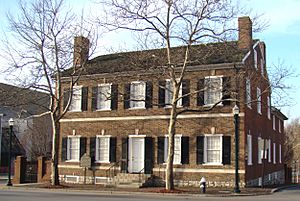
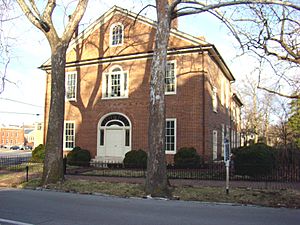
Lexington has many historic sites. The Lexington Opera House is a beautiful old theater. The Mary Todd Lincoln House was the childhood home of Mary Todd Lincoln, who became the wife of President Abraham Lincoln. The Hunt-Morgan House was home to John Wesley Hunt, a very rich man, and his grandson, John Hunt Morgan, a Confederate General.
The University of Kentucky Art Museum is the main art museum in Lexington. It has over 4,000 art pieces, from old masters to modern art. It also hosts special exhibits.
The old Woolworth's building in Lexington is important for its role in the Civil Rights Movement. During the 1960s, people held protests there to end segregation. They wanted equal service and job opportunities. The building was later taken down in 2004.
You can also visit "Pablo Eskobear" at the Kentucky for Kentucky Fun Mall. This is a stuffed American black bear that became famous from a unique incident.
Sports in Lexington
College Sports
The Kentucky Wildcats are the sports teams of the University of Kentucky. They are the most popular sports team in Lexington. The university has 22 different sports teams. Most of them play in the Southeastern Conference. The men's basketball team is one of the best in NCAA history. They have won eight national championships. They were also the first team to win 2,000 games.
Professional Sports
Lexington has the Lexington Legends, a professional baseball team. They play in the Atlantic League of Professional Baseball. Their home games are at The Ballpark at 207 Legends Lane.
The city also has Lexington SC, a professional soccer club. They have a men's team in the USL Championship and a women's team in the USL Super League. The club started in 2021 and plays at Lexington SC Stadium.
Horse Racing and Equestrian Events
Lexington is home to two horse racing tracks: Keeneland and The Red Mile. Keeneland hosts live races in April and October. It has kept many of its old traditions since it opened in 1936. Keeneland also has the world's largest auction house for Thoroughbred horses. Many famous racehorses were bought at Keeneland sales. Its most important race is the Blue Grass Stakes. The Red Mile is the oldest horse racing track in Lexington. It hosts harness racing, where horses pull two-wheeled carts.
The Kentucky Horse Park opened in 1978. It is a popular tourist spot and museum. It is also a working horse farm. It has hosted the Rolex Kentucky Three Day Event, one of the top horse riding competitions in the world. In 2010, Lexington was the first city outside of Europe to host the World Equestrian Games.
Other Sports
Lexington is home to Roller Derby of Central Kentucky and the Lexington Bike Polo League. In 2017, Lexington hosted the World Hardcourt Bike Polo Championship. This is the most competitive bike polo tournament in the world.
The Dirt Bowl is a long-running local basketball tournament. It is held at Douglass Park. It has been around since the early 1970s. The courts at Douglass Park used to be dirt, which gave the tournament its name. Now, the courts are paved.
Parks and Recreation
City Parks and Facilities
Lexington has over 100 parks. They range in size from small neighborhood parks to large ones like Masterson Station Park. Many parks have recently been improved.
Lexington's parks include:
- Five public golf courses.
- Six dog parks for your furry friends.
- Three public 18-hole disc golf courses.
- A public skate park at Woodland Park with ramps and bowls.
- Triangle Park in downtown Lexington.
- Gatton Park, a new 10-acre park in downtown, is expected to open in 2025.
Natural Areas
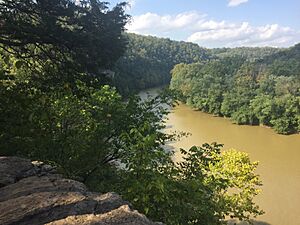
The city has Raven Run Nature Sanctuary. It is a 734-acre (2.97 km2) nature preserve along the Kentucky River Palisades.
The Arboretum is a 100-acre (0.40 km2) preserve next to the University of Kentucky.
McConnell Springs is a historic 26-acre (0.11 km2) park. It is located in an industrial area.
Government in Lexington
Mayor
Lexington-Fayette elects a mayor every four years. The current mayor is Linda Gorton. She is in her second term. She won the election in November 2022. Mayor Gorton can serve up to three terms in a row.
Urban County Council
The city's law-making group is the 15-member Urban County Council. Twelve members represent specific areas and serve two-year terms. Three members are elected by the whole city and serve four-year terms. The person who gets the most votes among the city-wide members becomes the vice mayor. The vice mayor leads the council when the mayor is not there. The council members for 2025 are:
| Councilmember | District | Term ends |
|---|---|---|
| Dan Wu | Vice Mayor | 2026 |
| James Brown | At-large | 2026 |
| Chuck Ellinger II | At-large | 2026 |
| Tyler Morton | 1st | 2026 |
| Shayla Lynch | 2nd | 2026 |
| Hannah LeGris | 3rd | 2026 |
| Emma Curtis | 4th | 2026 |
| Liz Sheehan | 5th | 2026 |
| Denise Gray | 6th | 2026 |
| Joseph Hale | 7th | 2026 |
| Amy Beasley | 8th | 2026 |
| Whitney Baxter | 9th | 2026 |
| Dave Sevigny | 10th | 2026 |
| Jennifer Reynolds | 11th | 2026 |
| Hilary Boone | 12th | 2026 |
Government Meetings
Most government meetings in Lexington-Fayette are open to the public. Council meetings are held on Thursdays at 6 p.m. at the LFUCG Government Center.
Judicial System
Lexington has three main courts downtown. These are the Fayette Circuit Court, Fayette District Court, and the US District Court.
Education in Lexington
Many adults in Lexington have college degrees. About 22.4% of people over 25 have a bachelor's degree. Another 11.4% have a master's degree.
The city's public schools are run by the Fayette County Public Schools. The system has six main high schools and many smaller ones. There are also 12 middle schools and 37 elementary schools. Many private schools also serve the area. The school system's budget for 2023–2024 was over $677 million.
Lexington has two main universities. The University of Kentucky is the state's largest public university. Transylvania University is the oldest four-year university in Kentucky. It was also the first university west of the Allegheny Mountains.
Media in Lexington
Lexington's biggest daily newspaper is the Lexington Herald-Leader. Business Lexington is a monthly newspaper about local businesses. The Chevy Chaser Magazine and Southsider Magazine are community magazines.
The area also has eight main television stations. These include WLEX, WKYT, and WTVQ. Kentucky Educational Television (KET), the state's public television network, is based in Lexington. It is one of the largest public networks in the country.
Transportation in Lexington
Highways
I-75 runs north and south near Lexington. I-64 runs east and west on the northern side of the city. Several U.S. Routes also meet in Lexington. These include Route 25, Route 27, Route 60, Route 68, and Route 421.
Lexington can have a lot of traffic. This is partly because there are not many large highways directly through the city. Also, the University of Kentucky is close to downtown. Many people also travel into the city from nearby towns.
Railroads
In the past, passenger trains ran through Lexington. The Southern Railway had trains like the Ponce de Leon and the Royal Palm that went to Florida. The last of these trains left Lexington in 1970. Union Station was a train station open from 1907 to 1960.
Airport
The Blue Grass Airport is on the west side of Lexington. It offers passenger flights from four airlines: Allegiant, American, Delta, and United.
How People Travel
In 2019, most working people in Lexington (79.3%) drove alone to work. About 9.3% carpooled. Only 2.0% used public transportation, and 3.0% walked. About 4.4% of people worked from home.
In 2016, about 7.4% of homes in Lexington did not have a car. This was lower than the national average of 8.7%. On average, Lexington homes had 1.7 cars.
Public Safety
Law Enforcement
The Lexington-Fayette Urban County Government Division of Police handles most law enforcement in the area. This police department has about 639 police officers. It was formed in 1974 when the city and county police departments merged. The Fayette County Sheriff's Office handles court security, prisoner transport, and tax collection.
Fire Protection
The Lexington Fire Department provides all fire and rescue services in Lexington-Fayette County. This department was formed in 1973 when the county and city fire departments merged. It is the largest single fire department in Kentucky. It has over 600 staff members and 24 fire stations.
Sister Cities
Lexington has sister city relationships with other cities around the world. These partnerships help promote cultural exchange and understanding.
 Deauville, France (since 1957)
Deauville, France (since 1957) County Kildare, Ireland (since 1984)
County Kildare, Ireland (since 1984) Newmarket, United Kingdom (since 2003)
Newmarket, United Kingdom (since 2003) Shinhidaka, Japan (since 2006)
Shinhidaka, Japan (since 2006)
See also
 In Spanish: Lexington (Kentucky) para niños
In Spanish: Lexington (Kentucky) para niños


